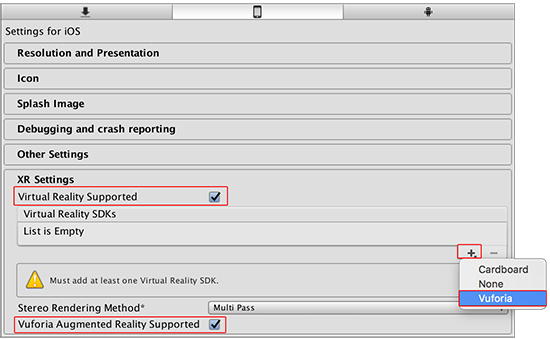- Unity User Manual (2019.2)
- XR
- XR SDKs
- Vuforia
- Vuforia platform configuration settings
Vuforia platform configuration settings
This section provides information about the important XR platform settings affecting development of Vuforia Augmented/Mixed Reality applications with Unity.
Here is a list of important XR Settings used in Vuforia’s Unity integration. To access these, open the Player settings (Edit > Project Settings, then select the Player category), then select the tab for the device you are building to):
Vuforia Augmented Reality support: Enables Vuforia Augmented Reality support in your application
Virtual Reality SDKs: Allows Vuforia features to be integrated into VR applications. This menu is displayed when you select the Virtual Reality Supported checkbox.

Vuforia supports the following XR SDKs:
The Vuforia VR SDK (in the Virtual Reality SDKs list) is a stand-alone VR configuration with no external dependencies. It provides stereo rendering and distortion correction, along with head and hand tracking (with positional tracking available for Tango), and viewer profile support to define parameters of various VR headwear.
Stereo rendering method
The stereo rendering method is only relevant when using the Vuforia Virtual Reality SDK. Android, iOS, and Windows Mixed Reality devices support Multi-Pass instancing, Single-Pass Instancing and non-instancing.
When using Vuforia Augmented Reality with another Virtual Reality SDK, stereo rendering support is determined by the Virtual Reality SDK being used.
Supported graphics APIs
Recommendation: In Unity’s Player settings (menu: Edit > Project Settings, then select the Player category), select the tab for the device you are building to open the Other Settings panel and enable Use Auto Graphics API.
| Android | iOS | Windows |
|---|---|---|
| OpenGL ES 2.0 OpenGL ES 3.x |
OpenGL ES 2.0 OpenGL ES 3.x Metal (iOS 8+) |
DirectX 11 on Windows 10 |
Supported features
Vuforia provides a number of features to allow development of AR/MR applications.
The table below lists these features along with the OS and device types supporting them.
| Feature | Descripción | OS | Handhelds | Eyewear |
|---|---|---|---|---|
| Image Targets | Tracks planar images | Android, iOS, UPW | Sí | Sí |
| Multi Targets | Tracks geometric arrangements of images | Android, iOS, UPW | Sí | Sí |
| Cylinder Targets | Tracks images wrapped on cylinders and cones | Android, iOS, UPW | Sí | Sí |
| User Defined Targets | Tracks images captured by users at runtime | Android, iOS, UPW | Sí | Not recommended |
| Cloud Recognition | Cloud-based Image Targets | Android, iOS, UPW | Sí | Sí |
| Device Tracking | 3 DoF & 6 DoF positional tracking* | Android, iOS, UPW | Yes ( Limited to 6 DoF ) | Yes ( Limited to 6 DoF ) |
| VuMark | Customizable encodable AR markers | Android, iOS, UPW | Sí | Sí |
| Object Reco | Tracks 3D objects from scans | Android, iOS, UPW | Sí | Sí |
| Model Targets** | Track 3D objects from 3D models | Android, iOS, UPW | Sí | Sí |
| Smart Terrain | Track surfaces and geometry in the user’s environment | Android, iOS, UPW | Sí | Limitado |
| AR + VR | AR feature support for VR apps | Android, iOS, UPW | Sí | Sí |
* 6 degrees of freedom tracking is available for Tango and HoloLens devices
** Model Targets are available through the Vuforia Early Access Program and public in Unity 2017.3